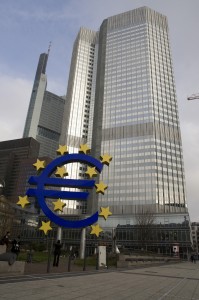What a lot of hassle
 The Troika has once again come out to play. This time, Cyprus has become the latest victim of a political tide sweeping Europe, obsessed with teaching peripheral Europe a lesson in how to “live within its means”.
The Troika has once again come out to play. This time, Cyprus has become the latest victim of a political tide sweeping Europe, obsessed with teaching peripheral Europe a lesson in how to “live within its means”.
The Cypriot banking system is in peril. It suffered huge losses on its vast holdings of Greek Government Debt during the restructuring. Furthermore, with its high exposure to Greece’s ailing economy along with a property bubble that is slowly but surely deflating, it is small wonder that Cyprus has survived up until now. Paul Krugman’s recent dubbing of Cyprus’ economy as “The Sum of All FUBAR” (F***ed up beyond all reason/recognition/repair), is a crude yet alarmingly pertinent assessment of matters.
Cyprus needs to raise €5.8bn before Monday in order to secure a €10bn loan from the EU. Otherwise, the European Central Bank’s Emergency Liquidity Assistance, the life-support to the illiquid, but solvent, main Cypriot banks, will be cut off. In this case, Cyprus could not survive within the Euro.
The future of the Eurozone, though fragile, has faced tougher tests in its recent history, and passed. No one could have envisaged Europe stumbling at the small hurdle of bailing out an economy that represents only 0.2% of Eurozone GDP (approximately €17bn).
Economically, the bailout is insignificant in magnitude. The implications of the bailout, however, appear to be the worry, particularly for Germany. Cyprus’ growth strategy was based, in part, on its status as an offshore financial centre. The balance sheets of Cyprus’ banks soared, ballooning to 800% of GDP in 2011, as money piled into this offshore haven. Accusations abound of Russian money laundering. The Cypriot Government denies this, yet something is not quite right. Cyprus is the largest investor in Russia, and in 2011 Cyprus-based businesses invested around €61bn in Russia alone, four times the size of Cypriot GDP.
Germany is simply refusing to fully bailout the rich Russians with taxpayers’ hard earned money. Instead, it has demanded that Cyprus coughs up 30% of its GDP up front, in cash, within a week.
Deciding on the best bailout strategy has not been easy. The original master plan: to levy a tax of at least 6.75% on all insured Cypriot bank deposits (under €100k), rising to 9.99% for uninsured deposits. The EU’s bailout conditions were unanimously rejected in Parliament on Tuesday, sending politicians back to the drawing board, and banks into a panicked frenzy. Banks have remained shut to prevent a run on the banks, and are not due to open until Tuesday.
Some have suggested tinkering with the proposed savings levy. For example, making those with deposits over €100,000 bare the brunt of the tax, to spare those for whom the levy would be unbearable. In fact, such a deal was initially proposed by the Eurozone, which had agreed to spare small savers and enact a significant haircut of 15.6% on the assets of foreign oligarchs and tycoons. Astonishingly this was rejected by Cypriot leader Nicos Anastasiades, who had hoped to cling on to an unsustainable and out dated banking model.
Other more nuanced alterations to the bailout package have been proposed. Felix Salmon, a finance blogger at Reuters, has suggested that insured deposits go untouched, whilst uninsured deposits are transformed into interest-bearing bank Certificates of Deposits (CDs), with the option of differing maturity dates. This would effectively ‘lock-in’ that particular source of bank funding for years to come, whilst ensuring the owners of these CDs hold freely tradable and liquid assets.
This is perhaps a moral issue, yet one that is still structured and debated within the narrow framework set out by the EU and which will doom Cyprus to years of recession and low-growth. Financial commentators may ponder various technicalities, involving ingenious methods of how best to administer the harsh terms of the bailout package. Yet ultimately, they are superficial in nature and do not offer a solution to the Eurozone’s systemic faults. There is a piece of the jigsaw puzzle missing, and that is political solidarity amongst Eurozone members. Without it, a partial breakup is inevitable.
Across the border, things are looking up for Turkish-administered Northern Cyprus. Though ‘poorer’ than its Greek-Cypriot counterparts, having been isolated from European markets during the ‘boom’ years, it has posted an average growth rate of nearly 4% since 2010, and is riding high on a wave of economic growth created by the Turkish economy, which has fared relatively well since the onset of the global financial crisis.
No doubt Turkish-Cypriots have experienced very tough times since the Cyprus’ divide in 1974, and still have a long way to go to meet the living standards of Greek-Cypriots. However it is on an upward path, aided by its receipt of constant and unwavering support from ‘big brother’ Turkey. In stark contrast the Republic of Cyprus’ historical ally, Greece, can itself be classified as “FUBAR” and its European ‘family’ has been found missing when most needed. Greek-Cypriots are now looking on with a sense of ‘what would have been’ had the small island not joined the Euro nearly six years ago.
Comments